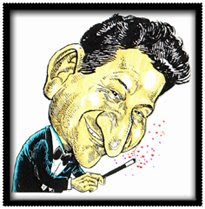
Jean Eugene Robert-Houdin (1805-1871) Aspiring teenaged magician Ehrich Weiss did not conjure the name "Harry Houdini" out of thin air. Following the hallowed tradition of his craft, the name pays homage to Jean Eugene Robert-Houdin, the French performer widely considered the father of modern magic. Adding the "i" followed tradition as well, as this was a common way that magicians invoked the name of the famous 18th century Italian conjurer Pinetti. "Harry," on the other hand, was merely a pleasantly American twist on "Ehrie," his boyhood nickname. But Houdini’s relationship with his famous predecessor was not as simple as their shared name suggests.Jean Eugene Robert was bitten by the magic bug just as he was entering his family’s clockmaking business in the French town of Blois. The young man enjoyed entertaining his friends with sleight-of-hand tricks, but at first gave no thought to performing professionally. At twenty-four, he married the daughter of a prominent Parisian clockmaker, soon adding their family name to his own and opening his own clockmaking studio in Paris with the backing of his father-in-law. Living in the French capital allowed Robert-Houdin to more fully indulge his interest in magic, and he eagerly caught every performance he could while developing friendships with a number of amateur and professional magicians. Particularly influential were Comte, a favorite of the French Kings and owner of his own theater, and Philippe, whose utilization of electricity would have the greatest impact on Robert-Houdin. During these years the clockmaker made mental notes about what he would do -- and not do -- if he ever took the stage himself.Perhaps inspired by the complex mechanical devices, or automata, demonstrated by Philippe and other conjurers, Robert-Houdin started building more than clocks. In 1844, a small android he had built for the Universal Exposition was purchased by American circus impresario P.T. Barnum for the handsome price of seven thousand francs. The timing was excellent, as it allowed Robert-Houdin time to finish the pieces he was building for a magical theater he would soon open in Paris. The public was enchanted by his elegantly appointed theater at the old Palais Royal, which featured numbers clearly inspired by Phillipe but with novel twists of their own. Even in this first endeavor, Robert-Houdin displayed a gift for presentation which would set him apart. In particular, his practice of appearing in normal evening attire, rather than elaborate robes, caught on and has led many to see him as the first "modern" magician.The routine that turned Robert-Houdin into a major attraction was not mechanical at all, but a number called "Second Sight," in which his son, blindfolded on stage, correctly identified objects held by his father in the audience. Again, Robert-Houdin cannot take credit for originating the act, which worked through an elaborate verbal code, but for improving it with consummate skill and showmanship. In this way, he resembled his future namesake: both Robert-Houdin and Houdini grew famous by adding their own genius to the work of those who came before.It may have been this very similarity which led Houdini to turn on his legendary predecessor. In 1908 he angered many in the profession with the publication of "The Unmasking of Robert-Houdin," a scathing attack in which he called the legend "a mere pretender, a man who waxed great on the brainwork of others." Besides detailing the origins of most of his routines in an effort to set the record straight, Houdini challenged Robert-Houdin’s assertion in his celebrated memoirs that his presentational reforms represented "a complete regeneration in the art of conjuring." Houdini also assailed Robert-Houdin’s "supreme egotism" and habit of exaggerating his exploits, charges often made against Houdini himself. Houdini’s overzealous attempt to unseat his celebrated predecessor probably had several sources. From one perspective, it can be seen as part of the lifelong war waged against his own imitators, for whom he felt nothing but contempt. It can also be seen as a manifestation of his substantial ego, and the need to elevate himself at the expense of any competitors, even those from the past. But given that the two men shared so much more than a name, perhaps it was Houdini’s way of responding -- in a way his ego and psyche would allow -- to the very criticisms so often leveled at him.J



















